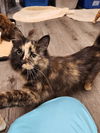
6/30/2024 1:11 PM
|
Every Home Needs a Cat and Every Cat Needs a Home
Inflammatory Bowel Disease (IBD) IBD is not a single disease. IBD is a group of chronic gastrointestinal disorders. IBD is caused by an infiltration of inflammatory cells into the walls of a cat's gastrointestinal tract. The infiltration of cells thickens the wall of the gastrointestinal tract and disrupts the intestine's ability to function properly. IBD occurs most often in middle-aged and older cats Symptoms of feline IBD are not specific. They may include vomiting, weight loss, diarrhea, lethargy and variable appetite. The symptoms of IBD can vary depending on the area of the digestive tract affected. A definitive diagnosis of feline IBD can only be made based on microscopical evaluation of tissue collected by means of an intestinal (or gastric) biopsy. There is no single best treatment for IBD in cats. Hypoallergenic diets are usually tried first. Corticosteroids like Prednisolone may be used to reduce inflammation of the gut. Antibiotics such as Metronidazole are commonly used. IBD is a chronic disease. Few cats are actually cured. Symptoms of IBD may wax and want over time. IBD can often be controlled such that affected cats are healthy and comfortable Vigilant monitoring by the veterinarian and owner is critical. |



